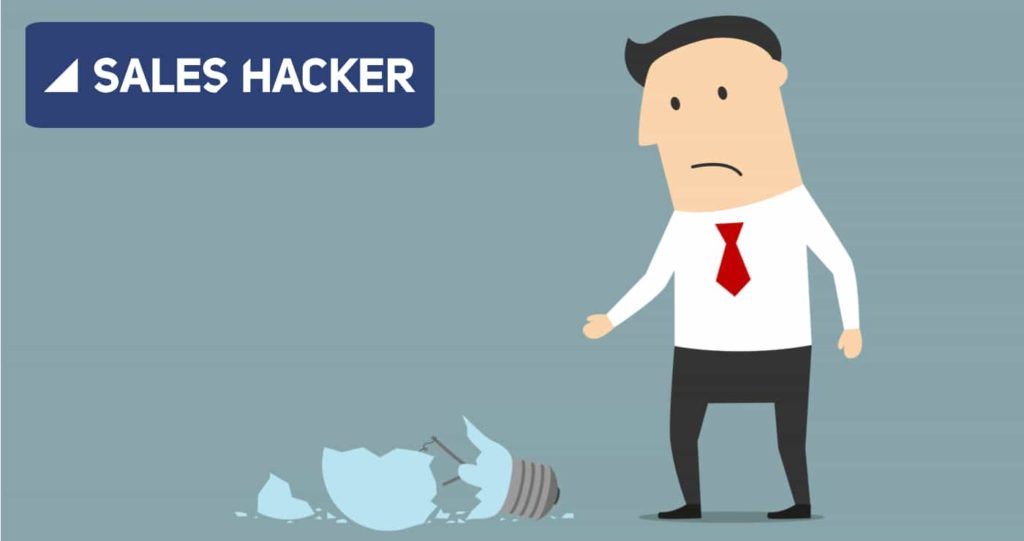The best salespeople are driven, not desperate.
Obviously, you don’t want to be perceived as “desperate.” Not by your friends, your co-workers, or your romantic partner. And hopefully, never by your clients.
After all, customers often arrive at a purchasing decision based more on how they feel about the salesperson and less about the actual solution. In many cases, trust, authenticity, and confidence can persuade a prospect as much as product features do.
Desperate sellers often get ditched eventually, sometimes even before they get the chance to make a pitch. That’s because desperation is a major turnoff, pushing prospects away and preventing trust and rapport from ever taking root. People realize that desperate sellers pass on burdens, pressure, and extra baggage instead of offering genuine relationships and tailor-fit solutions.
RELATED: What Not to Do in B2B Sales — 7 Signs You’re About to Kill the Deal
When it seems that you’re selling a problem instead of a product, who the heck will buy from you?
Prospects would rather seek other vendors than get hooked into signing up by a needy, desperate salesperson. At the end of the day, desperate salespeople exude confusion rather than confidence and they rightly deserve every flak they get.
Scenarios where you’ll come off as desperate
Here are the top 11 mistakes desperate salespeople make:
- Chasing anything that moves.
- Excessive frequency of cold calling.
- Begging for the sale.
- Talking way too much.
- Lacking discipline.
- Being “too” available.
- Mind-boggling flexibility.
- Not following through.
- Can’t take no for an answer.
- Rushing the sales cycle.
- You’re a discount freak.
In sales, how you react to a desperate situation and how your clients perceive that reaction matter a lot. Losing your cool is a sign of weakness. Appearing too eager can be construed as desperation.
Accommodating every whimsical request from a customer can make your CRM — including poorly vetted prospects — is as low as any salesperson can get.
Here are some scenarios where the optics and your behavior might come off as desperate to your customers:
1) Chase anything that moves.
You’re a salesperson not a Siberian husky. You are trained to act like a professional and to practice discernment, especially when engaging prospects. Chasing after low quality leads usually ends up nowhere but only wastes valuable time. Don’t lower the bar of your lead qualification process just so you can make a pitch and try your luck on anything that talks.
2) Excessive frequency of cold calls.
If cold calling makes up bulk of your lead generation numbers, then something is wrong with:
- Your process
- Your technology stack
- Your organization’s core selling philosophy.
Regardless, the practice paints a desperate picture and takes your team decades back in time (when the vast majority of people still endured cold calls).
3) Begging.
Warming up to a new prospect is integral to relationship-building but it doesn’t include demeaning your brand by practically begging for appointments, feedback, or referrals.
4) You talk too much.
You don’t want to drop any engagement so you try to solve any problem the customer happens to mention, including those that are beyond the scope of your product/service. The result: you end up talking too much and giving unsolicited (and likely wrong) advice.
5) Lack of discipline.
Desperation leads to an unfortunate breakdown in process, policy, and quality. Facts tend to be distorted into exaggerations, fluff, ambiguity, and outright lies particularly when doing so translates to closed deals. You sound too salesy. Signups suddenly become more important than building rapport, establishing trust, articulating value, solving pain points, and meeting needs.
6) Too much availability (it shows signs of inactivity).
It’s kind of like when you look at a row of restaurants and most of them are buzzing with customers, but there’s that one which is empty. It makes you wonder, hmm, why is that place a ghost town?
Fearful of losing a lead, you convey the idea that you can accommodate the prospect’s schedule 100 percent. Amazingly, there are no conflicts at whatever date the customer proposes. For most professions though, an empty calendar is a sure sign of inactivity and desperation. If the client thinks that they’re the only name on your event book, then their opinion of your brand suffers.
7) Mind-boggling flexibility.
A product, service, or seller that appears too good to be true likely is. Accommodating even the most ludicrous whim, feature request, or customer care requirement shows an utter lack of focus, discipline, and integrity in your product design.
8) Establishing red lines then not following through.
Declaring an ultimatum then going back on your word is not flexibility but a poor bluff gone desperate. If the engagement reaches a well-defined threshold and you perform something quite different from the expected action, then your prospect will doubt every subsequent statement you make.
9) Can’t take no for an answer.
You assume the prospect is interested and you won’t take a hint that they’re really not into you. So you stubbornly keep sending emails and making calls even after the prospect ceased responding to both. Remember, even marriages break up. Sales is pretty much about letting go and moving on to the next prospect.
10) Rushing the sales cycle.
To make the numbers, you engage as many leads as you can and force them to go through the stages of the customer journey much faster than normal. Fine-tuning your sales velocity is always a good thing but expecting your customer to sign up before they even learn to trust you is a moonshot. No one likes to be hurried into a decision, especially customers.
11) You’re a discount freak.
Limited perks, special offers, and discounts work wonders when unleashed the right way. However, that doesn’t include giving them away whenever you want just to close a deal faster. Timed perfectly, discounts do move the needle. But given too early or too frequently, special offers and limited perks won’t appear special, limited, or appealing to the prospect.
How not to be a desperate salesperson

Finding yourself in a desperate situation is pretty much a guaranteed experience in the world of sales. What really matters is the way you behave in a desperate situation.
Allowing your customers to feel desperation in the air only gives them a valid reason to doubt your pitch, reject your proposal, and engage your competitors.
Turn the tables by feeding your drive instead. Desperation creates an atmosphere that suffocates prospects. In contrast, drive infuses the air with positive energy that builds trust and confidence. Here are some steps you can take to appear driven instead of desperate:
1) Manage your time well.
Desperate situations primarily arise from gross misappropriation of time. Stay productive by meeting sales activity targets, training needs, and other benchmarks.
2) Prioritize the customer.
It’s not about you, it’s about customers. And it’s not about your problems but theirs. When you prioritize customer success, you ensure they get the experience they deserve, regardless of the speed at which they arrive at a decision.
3) Don’t wait until your pipeline is half empty.
Half-empty pipelines can cause real panic. Make sure your team has the tools and the training to keep your pipeline healthy and flowing.
4) Fine-tune your lead qualification.
Avoid wasting time on poorly vetted prospects. Reduce the likelihood of engaging low-quality leads.
5) Do your prospecting research.
Conduct relevant research on customers you plan to engage. Warm up cold calls and emails with business intelligence, referrals, or insider information. Make a strong case for your product instead of dangling huge discounts to trick prospects into buying.
6) At the end of the day, have some dignity.
Customers always deserve excellent service but that shouldn’t push you into begging, issuing false ultimatums, and contorting your service agreement. Excellent service means you master your craft, perfect your pitch, and channel your drive to genuinely help customers and make them realize the value of what you are offering.







